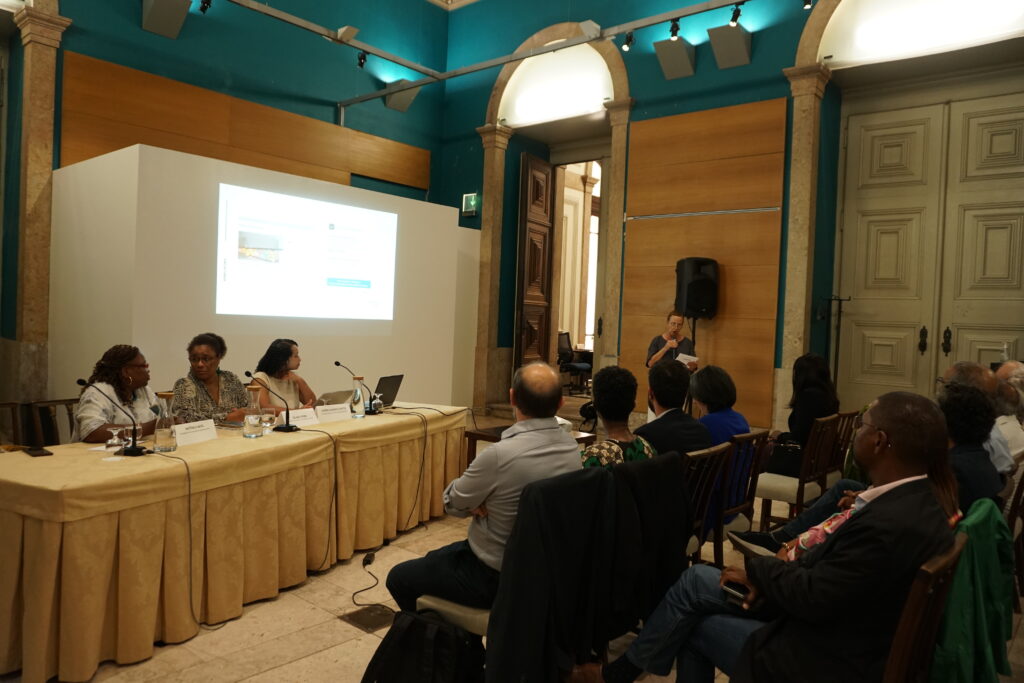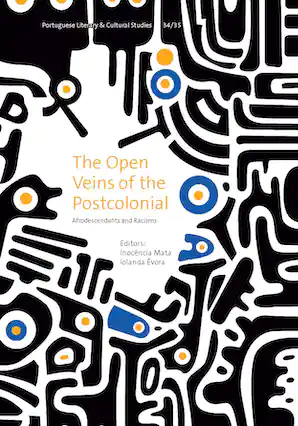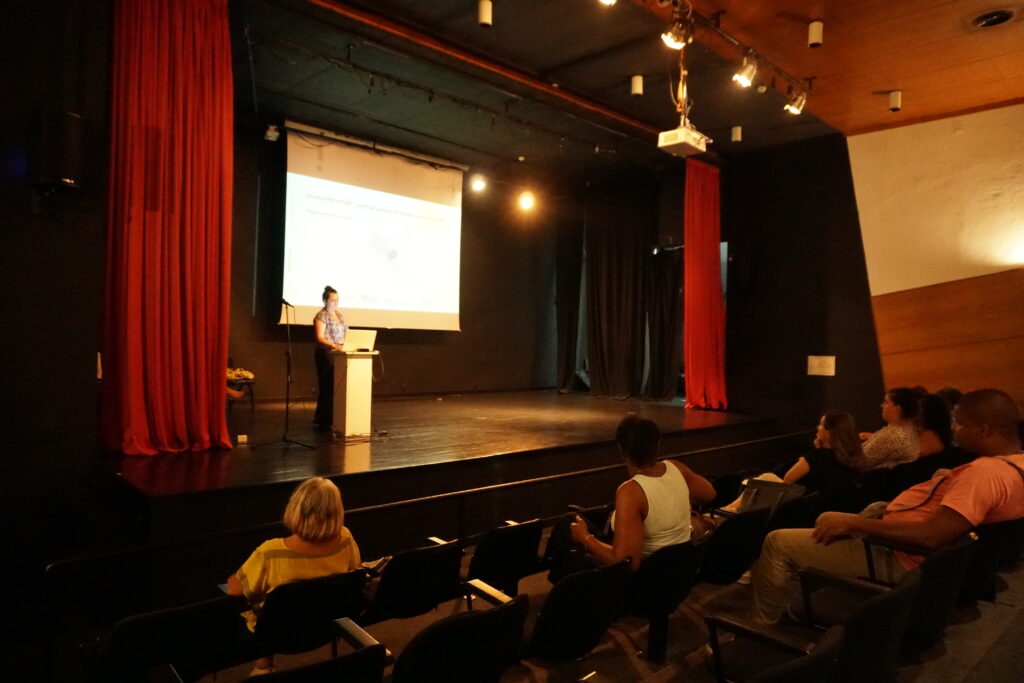CEsA Digital Magazine #1 | Research: The AFRO-PORT project is coming to an end but leaves behind a pioneering legacy in research into Afrodescendants in Portugal

AFRO-PORT, a CEsA research project with FCT (Foundation for Science and Technology) funding, studied Afrodescendants in Portugal from 2018 to 2022. The closing cycle took place in September 2022 and included the presentation of the results of the study on the profile of Afrodescendant organisations in the Lisbon Metropolitan Area, as well as the launch of a special edition of the Portuguese Literary and Cultural Studies magazine and the documentary “3×4 Afro-Portuguese: Portraits of a plural identity”

The closing cycle of the AFRO-PORT Project – “Afrodescendants in Portugal: sociability, representation and sociopolitical and cultural dynamics. Study in the Lisbon Metropolitan Area (CEsA/ISEG/ULisbon, FCT/PTDC/SOC-ANT/30651/2017)” took place on 16 and 21 December 2022 at Lisbon Municipal Council and the Carnide Cultural Centre, respectively. AFRO-PORT is a CEsA research project coordinated by Professor Iolanda Évora (CEsA/CSG/ISEG/ULisbon) and co-coordinated by Professor Inocência Mata (LAC/ULisbon and CEComp/FLUL/ULisbon), with FCT (Foundation for Science and Technology) funding, which stood out as pioneering research into Afrodescendants in Portugal from 2018 to 2022.
AFRO-PORT focused on researching Afrodescendants in Portugal with the main goal of identifying the affirmation processes for securing rights. Other goals included: characterising the Afrodescendants in the Lisbon Metropolitan Area in a Portuguese social setting, asking about the emergence of the Afrodescendants as a new group and their place in society, understanding the mechanisms that exclude Afrodescendants and at the same time identifying the process for securing rights.
Regarding the increasingly frequent use of the term “Afrodescendants” and the concept of “Afrodescendancy”, the researcher at the Centre for African and Development Studies (CEsA/CSG/ISEG/ULisbon) and coordinator of AFRO-PORT, Iolanda Évora, highlighted the importance of being able to monitor the anchoring processes of a concept or category in a certain social context, “as not all of the people or groups identify as such”. “We are faced with a fluid phenomenon that is in the process of becoming rooted, which means that perceptions are being built as a result of and as an expression of Portuguese society and its diversity”, explained Évora.
And it was research into a topic in the process of being constructed and undergoing social transformation in Portugal that gave AFRO-PORT its innovative and pioneering character. “Before starting this project, we didn’t realise that there were young people who were born here and do not call themselves Afrodescendants; rather they say they are second, third, fourth generation Africans. But then I think: weren’t they born here?! These are the voices we want to hear”, said Inocência Mata, a researcher at the Centre for Comparative Studies (CEComp/FLUL/ULisbon) and co-coordinator of AFRO-PORT.
For the coordinators of AFRO-PORT, the use of the term “Afrodescendant” has a number of meanings. Apart from the research, they realised that several people were asking if this wasn’t just a modern way of continuing not to accept black people as such in Europe. “Is Afrodescendant this new term because people won’t admit that black people can be citizens with rights in the Old Continent and continue to be called African?”, asked Évora, based on the statement collected during the research.
Special edition of the PLCS journal on Afrodescendants and racism

The first session in the closing cycle of the AFRO-PORT Project was held at Lisbon Municipal Council on 16 September 2022. The event consisted of launching a special edition of the Portuguese Literary and Cultural Studies magazine on Afrodescendants and racism: “The Open Veins of the Postcolonial: Afrodescendants and Racisms” (click here to access). This thematic issue has 17 articles on different subjects, such as African presence in Portugal since the 16th century, black autonomy in Portugal, the idea of race and the meaning of whiteness, the reformulation of racist and colonial discourse, etc.
The research undertaken for the magazine was presented by Aurora Almada e Santos (Institute of Contemporary History/Nova University Lisbon) and by Inocência Mata. “This is the first publication from the AFRO-PORT project. We spent two years working on this magazine because we wanted it to bring a more in-depth and less immediate reflection on the subjects we were discussing. We mainly wanted to remove this idea that the issue of racism only applies to immigrants in Portuguese society”, said Mata.
The event was also attended and supported by councillors Beatriz Gomes Dias and Rui Tavares. “It’s very important that the Afro-Portuguese and Afrodescendant issue has reached the pages of a magazine as important as this one”, complimented Rui Tavares. “It brings a perspective that brings to light a wide range of discrimination issues. It’s very important to look at it like this because it breaks with myths, definitions, the set of hierarchies, and contributes to this fight against racism and discrimination”, concluded Beatriz Gomes.
Study on Afrodescendant associations in Lisbon and launch of a short film
The second session in the closing cycle of the AFRO-PORT Project took place in the Carnide Cultural Centre in Lisbon on 21 September 2022 and consisted of the presentation of the main results from the “Afrodescendant Associations in the Lisbon Metropolitan Area: Topics for discussion” study and the launch of the short film “3×4. Afro-Portuguese: Portraits of a plural identity” (Nêga Filmes), an audiovisual production developed under the scope of the AFRO-PORT Project.
The question of the reasons for the use of the term was brought up again in this session. For the co-coordinator of AFRO-PORT, Inocência Mata, speaking of Afrodescendancy elicits a mix of feelings and questions, because at the same time as it proudly alludes to African origin, it is also a way of avoiding the use of the word “black”. “Nowadays, claiming to be a Portuguese Afrodescendant means claiming belonging and ancestry at the same time. It also serves for public policies to bear in mind this discrimination of difference, and we need facts and figures to be able to tell the authorities that there is structural and institutional racism in Portugal”, concluded Mata.
The results of the study on the profile of the associations were presented by Mila Dezan (MDCI/ISEG/ULisbon). The research initially mapped out around 140 associations operating in the Lisbon Metropolitan Area and that deal with issues related to Afrodescendants, but only 22 of them identified themselves as Afrodescendants.

“We found some resistance in the organisations to presenting themselves as Afrodescendants. Some did so, but are cautious when it comes to using this term officially”, according to Dezan. “This leads us to wonder if this term has been imposed or if we’re witnessing the beginning of a new social characterisation to justify this resistance. What are the advantages and disadvantages of presenting themselves as Afrodescendant organisations?”, she asked.
In her comments on the study, Évora was of the opinion that several issues had been raised. “What is this term replacing and what convenience and benefits does it bring? Some associations use the term for example when they are talking to public authorities. My expectation as a social scientist is that these communities will use this term and be very clear about what it means”, Évora stressed.
The meeting was marked by the launch of the short film “3×4 Afro-Portuguese: Portraits of a plural identity” (Nêga Filmes), an audiovisual production developed under the scope of the AFRO-PORT Project (you can watch it below, available only in Portuguese). In 11 interviews with different people, including men, women, young people and the elderly, the film paints a picture of what people in Portugal think about the concept of Afrodescendants.
Further information about the AFRO-PORT activities, events and news can be found on the official project website (https://cesa.rc.iseg.ulisboa.pt/afroport/).
Read/See more:
Short film “3×4 Afro-Portuguese: Portraits of a plural identity” (Nêga Filmes) (only in Portuguese)
Text published in issue n. 1 of CEsA Digital Magazine. Authorship: Marianna Rios/Communication CEsA. Editing: Sónia Frias/CEsA Board and Filipe Batista/Communication CEsA. Translation: Inês Hugon. Design: Felipe Vaz.





